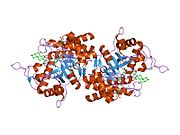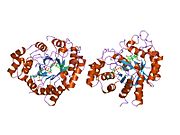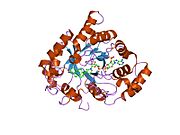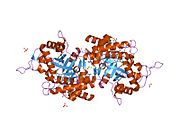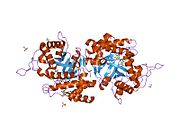Biology:AKR1C1
 Generic protein structure example |
Aldo-keto reductase family 1 member C1 also known as 20α-hydroxysteroid dehydrogenase, 3α-hydroxysteroid dehydrogenase, and dihydrodiol dehydrogenase 1/2 is an enzyme that in humans is encoded by the AKR1C1 gene.[1][2]
This gene encodes a member of the aldo/keto reductase superfamily, which consists of more than 40 known enzymes and proteins. These enzymes catalyze the conversion of aldehydes and ketones to their corresponding alcohols by utilizing NADH and/or NADPH as cofactors. The enzymes display overlapping but distinct substrate specificity. This enzyme catalyzes the reduction of progesterone to the inactive form 20-alpha-hydroxy-progesterone. This gene shares high sequence identity with three other gene members, and is clustered with those three genes at chromosome 10p15-p14.[2]
References
- ↑ "cDNA and deduced amino acid sequences of a human colon dihydrodiol dehydrogenase". Biochimica et Biophysica Acta (BBA) - Bioenergetics 1186 (1–2): 129–32. Jun 1994. doi:10.1016/0005-2728(94)90144-9. PMID 8011662.
- ↑ 2.0 2.1 "Entrez Gene: AKR1C1 aldo-keto reductase family 1, member C1 (dihydrodiol dehydrogenase 1; 20-alpha (3-alpha)-hydroxysteroid dehydrogenase)". https://www.ncbi.nlm.nih.gov/sites/entrez?Db=gene&Cmd=ShowDetailView&TermToSearch=1645.
External links
- Human AKR1C1 genome location and AKR1C1 gene details page in the UCSC Genome Browser.
- Human C9 genome location and C9 gene details page in the UCSC Genome Browser.
Further reading
- "Regulation of human dihydrodiol dehydrogenase by Michael acceptor xenobiotics". The Journal of Biological Chemistry 269 (22): 15558–62. Jun 1994. doi:10.1016/S0021-9258(17)40716-2. PMID 7515059.
- "Distribution of 3 alpha-hydroxysteroid dehydrogenase in rat brain and molecular cloning of multiple cDNAs encoding structurally related proteins in humans". The Journal of Steroid Biochemistry and Molecular Biology 53 (1–6): 41–6. Jun 1995. doi:10.1016/0960-0760(95)00019-V. PMID 7626489.
- "Localization of multiple human dihydrodiol dehydrogenase (DDH1 and DDH2) and chlordecone reductase (CHDR) genes in chromosome 10 by the polymerase chain reaction and fluorescence in situ hybridization". Genomics 25 (2): 588–90. Jan 1995. doi:10.1016/0888-7543(95)80066-U. PMID 7789999.
- "Genomic organization and chromosomal localization of a novel human hepatic dihydrodiol dehydrogenase with high affinity bile acid binding". The Journal of Biological Chemistry 269 (11): 8416–22. Mar 1994. doi:10.1016/S0021-9258(17)37210-1. PMID 8132567.
- "Molecular cloning of two human liver 3 alpha-hydroxysteroid/dihydrodiol dehydrogenase isoenzymes that are identical with chlordecone reductase and bile-acid binder". The Biochemical Journal 299 (2): 545–52. Apr 1994. doi:10.1042/bj2990545. PMID 8172617.
- "Molecular cloning of multiple cDNAs encoding human enzymes structurally related to 3 alpha-hydroxysteroid dehydrogenase". The Journal of Steroid Biochemistry and Molecular Biology 46 (6): 673–9. Dec 1993. doi:10.1016/0960-0760(93)90308-J. PMID 8274401.
- "cDNA cloning and expression of the human hepatic bile acid-binding protein. A member of the monomeric reductase gene family". The Journal of Biological Chemistry 268 (14): 10448–57. May 1993. doi:10.1016/S0021-9258(18)82220-7. PMID 8486699.
- "Relationship of human liver dihydrodiol dehydrogenases to hepatic bile-acid-binding protein and an oxidoreductase of human colon cells". The Biochemical Journal 313 (2): 373–6. Jan 1996. doi:10.1042/bj3130373. PMID 8573067.
- "Major differences exist in the function and tissue-specific expression of human aflatoxin B1 aldehyde reductase and the principal human aldo-keto reductase AKR1 family members". The Biochemical Journal 343 (2): 487–504. Oct 1999. doi:10.1042/bj3430487. PMID 10510318.
- "Close kinship of human 20alpha-hydroxysteroid dehydrogenase gene with three aldo-keto reductase genes". Genes to Cells 5 (2): 111–25. Feb 2000. doi:10.1046/j.1365-2443.2000.00310.x. PMID 10672042.
- "Characterization of a human 20alpha-hydroxysteroid dehydrogenase". Journal of Molecular Endocrinology 25 (2): 221–8. Oct 2000. doi:10.1677/jme.0.0250221. PMID 11013348.
- "Structure of the human 3alpha-hydroxysteroid dehydrogenase type 3 in complex with testosterone and NADP at 1.25-A resolution". The Journal of Biological Chemistry 276 (45): 42091–8. Nov 2001. doi:10.1074/jbc.M105610200. PMID 11514561.
- "Expression of dihydrodiol dehydrogenase in the resected stage I non-small cell lung cancer". Oncology Reports 9 (3): 515–9. 2002. doi:10.3892/or.9.3.515. PMID 11956619.
- "Reduction of dihydrodiol dehydrogenase expression in resected hepatocellular carcinoma". Oncology Reports 10 (2): 271–6. 2003. doi:10.3892/or.10.2.271. PMID 12579257.
- "Expression of 20alpha-hydroxysteroid dehydrogenase mRNA in human endometrium and decidua". Endocrine Journal 50 (1): 105–11. Feb 2003. doi:10.1507/endocrj.50.105. PMID 12733716.
- "Human 20alpha-hydroxysteroid dehydrogenase: crystallographic and site-directed mutagenesis studies lead to the identification of an alternative binding site for C21-steroids". Journal of Molecular Biology 331 (3): 593–604. Aug 2003. doi:10.1016/S0022-2836(03)00762-9. PMID 12899831.
- "Altered expression of 3 alpha-hydroxysteroid dehydrogenases in human glaucomatous optic nerve head astrocytes". Neurobiology of Disease 14 (1): 63–73. Oct 2003. doi:10.1016/S0969-9961(03)00101-3. PMID 13678667.
 |
